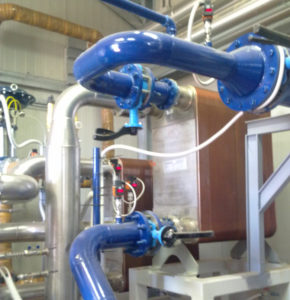Brazed plate exchangers in ORC cogeneration
A kind of cogeneration which is becoming very popular is the Organic Rankine Cycle cogeneration, so-called because it uses an organic fluid with high molecular mass, having an evaporation point lower then water steam. Using this kind of working fluids allows to take advantage of low temperature sources, such as combustion energy from biomasses and industrial waste heat. This way, they can be more easily converted to mechanical work to drive micro turbines in power generation, avoiding any further consumption of primary energy from any other kind of fuel.
T PLATE B brazed plate heat exchangers are an ideal high-efficiency solution for this kind of energy recovery applications. They are indeed an ideal option to increase the amount of heat transferred between the two fluids, thanks to the wide contact surface of the plates. In addition, condensation and evaporation of the refrigerating fluid employed in the cogeneration cycle, usually R245Fa, can be achieved using a fluid at average-high temperature: exhaust steam waste or pressurized water, as well as evaporative tower water or directly with a dry cooler. Both the solutions require a high efficient thermal exchange.
This kind of plants are best suited with brazed plate exchangers, being able to guarantee a series of essential requirements:
- High energy efficiency
- Minimum flow rate losses
- High pressures resistance f.v. +50 bar
- High temperatures resistance, from -200 up to +300° C
- Full vacuum condition operations
The absence of gaskets in this kind of heat exchangers minimizes maintenance activities, and the compact and light design ensures an easy installation, thanks to many assembly options available.
Heat dissipation of residual heat in a cogeneration plant can eventually be achieved using several solutions, depending on climatic conditions of the plant production location:
- Evaporative towers
- Brazed plate condensers
- Evaporative condensers
- Dry cooler
- Free cooler
- Plate heat exchangers




 Back to index
Back to index Download the complete book
Download the complete book